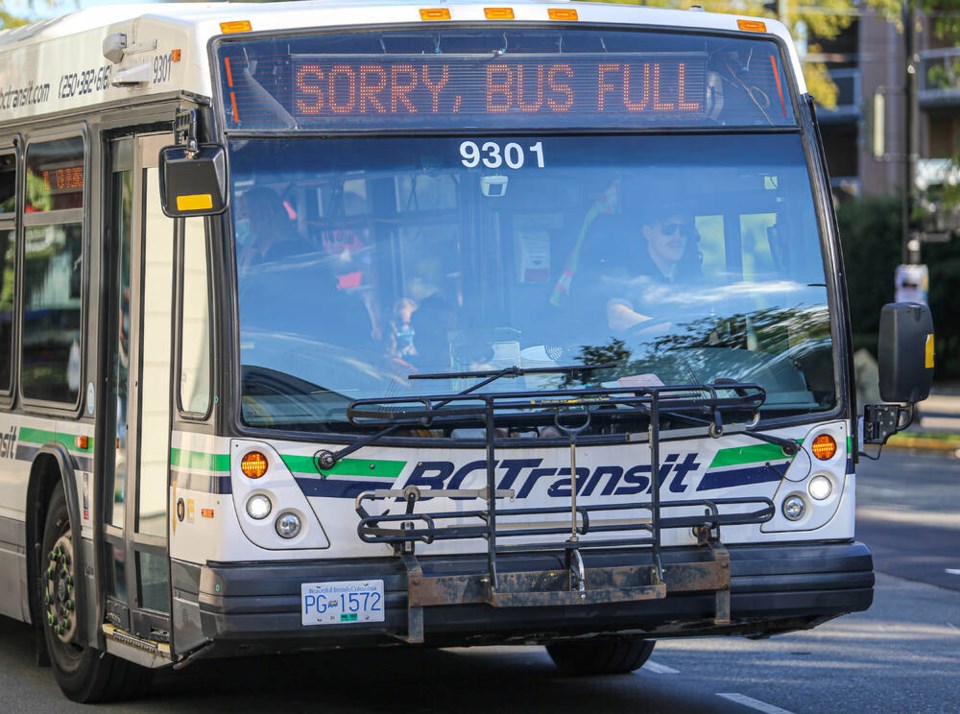B.C. Transit is taking a step into the future with an option for tap payment to board a bus.
The corporation announced Wednesday that its new payment system, Umo, will include options for paying via reloadable smart card, mobile app, debit card, credit card and mobile wallet.
“We are excited to be sharing news of the transformational electronic-fare system project that will make selecting transit as your mode of choice more convenient and accessible,” said B.C. Transit chief executive Erinn Pinkerton.
“Whether someone is a daily rider, occasional rider or haven’t taken their first trip yet, Umo will make their trip easier.”
Christy Ridout, vice-president of business development, said the foundation of the project is being called a bring-your-own ticket platform.
“You are able to actually purchase your fare products using the things that you already have at your fingertips,” she said. “So your phone, or when you get on the bus a credit card, debit.
“We will offer through our retail network a reloadable smart card.”
The change will cost $23.2 million and is being cost-shared by the federal government (50 per cent), the provincial government (40 per cent) and local government partners (10 per cent).
Ridout said the new fare mechanisms coming are expected to be cheaper per bus than the old ones, which were installed in the 1990s and can be difficult to get parts for. The existing system involves sliding a fare card through a farebox’s card reader, inserting paper tickets, or inserting paper money or coins.
The system will remove barriers such as the need to pre-purchase tickets or have exact change, although cash will still be accepted. Paper tickets will be phased out.
B.C. Transit first mentioned its intention to modernize its fare system in 2019. A plan for a pilot project in 2020 was called off when B.C. Transit couldn’t find what it wanted at the time.
Transportation Minister Rob Fleming said such initiatives are an important part of the effort to get bus ridership back to pre-pandemic levels, and to grow beyond that. “With the use of cash in sharp decline everywhere, efficient and convenient electronic fare payment options are the way of the future.”
The system will be implemented in two phases, first allowing the use of mobile and reloadable smart-card payments before adding credit card, debit card and mobile wallet. A pilot project, expected this fall, will take place in the Victoria Regional Transit System.
The Umo system being used comes from Cubic Transportation Systems Inc. Cubic is also behind Metro Vancouver’s TransLink Compass Card, which is similar to B.C. Transit’s system.
Ridout said customer privacy is “front of mind” and Cubic meets payment-industry security standards. “All customer information will be encrypted and there will be nothing that is personally identifiable.”
Unifor Local 333, the union representing B.C. Transit bus drivers, mechanics and maintenance workers in Greater Victoria, doesn’t have any issues with the system, said president Jean Barnes. “It looks pretty good to us,” she said. “It doesn’t affect our members in any way.”
B.C. Transit’s announcement follows the 2019 debut of another technological advancement called NextRide, which tracks bus locations and predicts arrival times for riders. NextRide cost $11,500 per bus. A contract for expansion to new markets has been signed.
B.C. Transit operates 88 transportation systems in 130 B.C. communities, excluding Metro Vancouver, and carries about 58 million passengers annually.
jbell@timescolonist.com
- - -
To comment on this story, send a letter to the editor: letters@timescolonist.com



